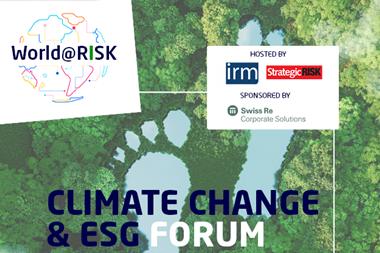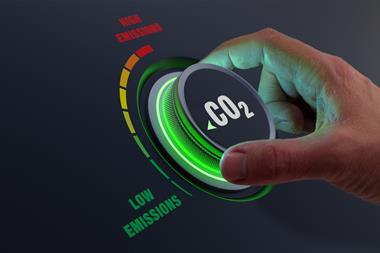This year’s StrategicRISK survey shows climate-related risks are the ‘in’ thing for boards, but for how long?
As we fast approach the StrategicRISK and IRM Climate Change and ESG Forum, our readers have told us their boards are more engaged than ever on issues surrounding climate change.
Half of respondents said their senior managers were ‘very engaged’, a rise from 44% in 2021 and 36% in 2020. A further 35% said they were ‘somewhat engaged’.
“It is in fashion at a board level to be asking about climate change,” confirms Sarah Gordon, chief executive and co-founder of Satarla. “They are all talking about it, but whether they are going beyond that and talking about sustainability more broadly is another thing.”
“One reason they are so engaged is because it’s their job to be thinking decades into the future and they are the strategic thinkers within the company.
”They can see from the regulations, such as TCFD, which consists of four steps starting with governance followed by strategy, that they have accountability right there. It’s vital for the board to keep pushing this but it needs to be broader into sustainability if they are not doing that already.”
Winter of discontent
According to the survey, there remain concerns that more immediate worries, including inflation and impending recession, could be diverting attention away from climate and sustainability risk.
At a business level, 50% said this was a worry (up from 34% a year ago) with the potential for distraction even starker where national governments are concerned, according to 65% of those polled (up from 55% a year ago).
“At a political level it is clear that governments are dodging hard questions on climate change risk and adaptation by hiding behind issues such as war and inflation,” said one respondent.
But the head of climate reporting at a utility company thought current challenges should be adding impetus to initiatives: “Energy price volatility and extreme weather events are drivers for acting with urgency on climate and sustainability risks.”
Drowning in red tape?
On a corporate level, it is clear that regulatory pressures are being felt more keenly.
Over half (55%) selected regulatory and disclosure requirements as key drivers behind their organisation’s approach to climate change, with 60% citing ESG concerns.
“For any British company, the TCFD [rules] are driving huge attention at the moment and that trickles out into lots of other organisations,” says Gordon.
“What would be interesting to know is are people talking about climate change risk management? Are they just doing reporting on emissions or is it full climate change? There are still some organisations who think it’s all about carbon.”
As was the case a year ago, reputational concerns remain important as the third biggest influencing factor for taking action (according to 45% of respondents).
It is not difficult to see why, with a growing number of lawsuits taking companies to task for ‘greenwashing’ and share prices increasingly vulnerable to the perception of external stakeholders, including investors and consumers.
Threat and opportunity
Once again, the majority of respondents see climate change as presenting both physical and transition risks (according to 75% of risk managers polled). Over a third of risk managers (35%) said they had been impacted by climate-related losses in the past five years (with two-thirds experiencing those losses directly).
Some made the direct link between the COVID-crisis and a warming climate (which makes it easier for pathogens to spread and mutate), while others cited natural catastrophes and weather extremes for causing property damage and/or business interruption.
Looking out to the future, respondents were clear about how their business would be impacted and what actions were required.
Over the three years StrategicRISK has carried out the survey, perceptions on the upside have evolved, with 25% now seeing the transition to a low-carbon economy as mainly an opportunity (compared to 18% a year ago). The majority, 63% of risk managers, continue to view the climate transition as both a threat and an opportunity.
A successful transition requires huge infrastructure spending and development, thought one compliance manager. “We are facing huge increases in costs due to the attempted transition to unreliable renewable energy and the restriction of reliable and cheaper sources.”
There is still a great deal of uncertainty and constantly moving goal posts, pointed out a director of risk.
“It is an opportunity [to transition] but there is downside where delivery is problematic. So I believe the rate of change has been underestimated and will accelerate, making existing plans redundant.”
World@RISK: ESG & climate Change Forum 2022 - new speakers announced for 15 November
- 1
- 2
- 3
- 4
- 5
- 6
- 7
 Currently reading
Currently readingClimate change: Fatal distraction
- 8
- 9
- 10
- 11
- 12
- 13
- 14
- 15
- 16
- 17
- 18





































No comments yet